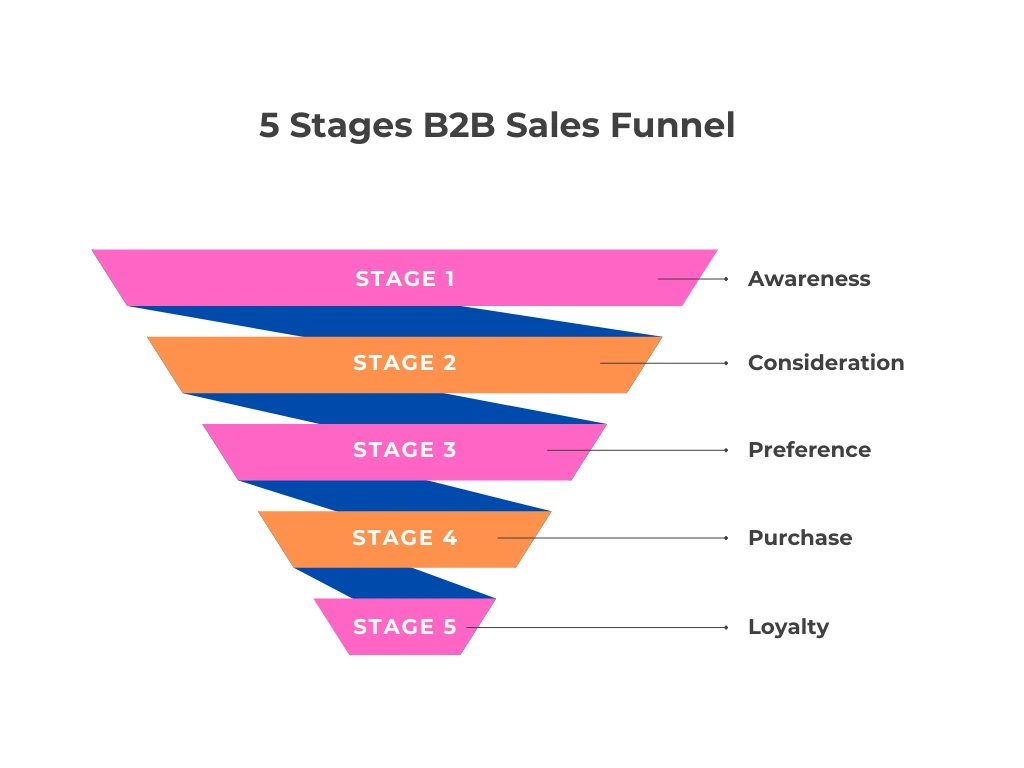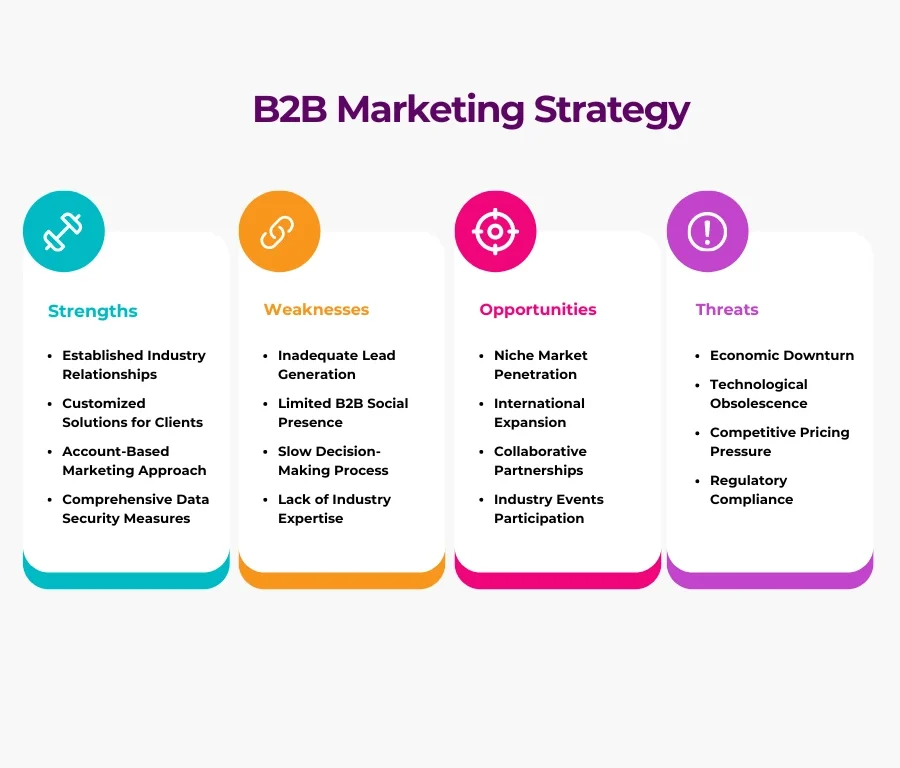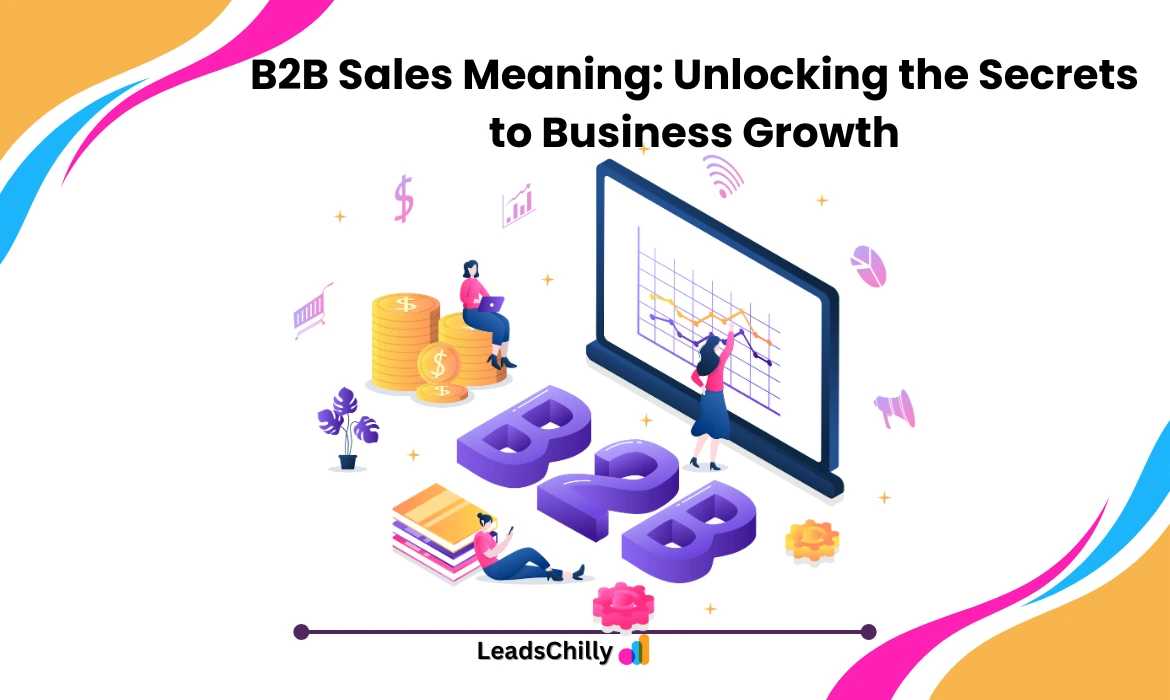In simple terms, B2B sales meaning involve transactions between two businesses, rather than between a business and a consumer. This sales model emphasizes long-term partnerships, complex buying processes, and high-value products or services. Companies that specialize in B2B sales depend heavily on these transactions to expand their market share and drive revenue growth. Understanding the meaning of true B2B sales is essential for businesses looking to thrive in competitive markets.
A 2024 Gartner report highlights that 77% of B2B buyers found their most recent purchase complex or difficult. You can explore more insights from the full report, but this statistic underscores the need for a well-thought-out B2B strategy to simplify the buyer’s journey and boost sales.
Ready to streamline your B2B sales process and attract high-quality leads? Sign up for LeadsChilly’s free 14-day trial today to supercharge your sales efforts and accelerate your business growth.
What Is B2B Sales? Breaking Down the Basics
At its core, B2B sales is far more complex than B2C sales (business-to-consumer sales), largely due to longer sales cycles, multiple stakeholders, and the need for tailored solutions. In contrast to B2C, where transactions focus on individuals, B2B revolves around building long-term relationships and delivering continuous value.
B2B Sales Meaning Explained
The definition of B2B sales refers to transactions where businesses sell products or services to other businesses. These sales are generally larger in scope, with extended decision-making processes. The objective is to build enduring partnerships that drive mutual benefits for both the seller and buyer.
How B2B Sales Differs from B2C Sales
Unlike B2C sales, which are more transactional and focus on individual consumers, B2B sales emphasize forming lasting partnerships. In B2B, sales cycles tend to be longer, involving multiple decision-makers, while B2C typically involves a single buyer and quicker transactions.

Key Characteristics of B2B Sales
Some of the defining features of B2B sales include:
- Multiple decision-makers: Teams consisting of procurement officers, department heads, and executives often influence purchase decisions.
- Longer sales cycles: Due to the complexity of the products and services involved, B2B sales require more time for consideration and evaluation.
- Complex solutions: B2B sales frequently involve customized offerings tailored to the unique needs of the buyer.
How Does the B2B Sales Process Work?
The B2B sales process is a series of structured steps designed to guide both the seller and buyer towards a successful transaction. This process typically starts with prospecting and ends with closing the deal, followed by ongoing support.
Stages of B2B Sales
The main stages of a B2B sales cycle include:
- Prospecting: Identifying potential business clients.
- Qualification: Assessing if the prospect fits your ideal customer profile.
- Presentation: Demonstrating how your product or service can meet the prospect’s needs.
- Negotiation: Settling the terms of the deal.
- Closing: Finalizing the sale and securing the contract.
Essential Skills for B2B Sales Success
Excelling in B2B sales requires a unique set of skills. Each interaction with a potential client is more than just a transaction—it’s about building a relationship, solving problems, and closing high-value deals.
Active Listening for Client Needs
Active listening is the foundation of successful B2B sales. By listening carefully to a client’s needs, you can understand their pain points and provide tailored solutions that directly address their business challenges.
Problem-Solving to Tailor Solutions
Problem-solving in B2B sales is essential. Each client has specific business needs, and as a sales professional, you must offer solutions that are not only relevant but also actionable. Tailored solutions demonstrate value and increase the chances of closing the sale.
Effective Negotiation for Mutual Benefits
Negotiation is a key skill in B2B sales, where high-value contracts and long-term partnerships are common. Sales professionals must negotiate deals that satisfy both parties. A well-balanced negotiation ensures repeat business and fosters long-term relationships.
Building Relationships for Long-Term Success
In B2B sales, building strong, trust-based relationships is essential. Long-term relationships lead to customer loyalty, higher retention rates, and repeat business. By nurturing client relationships, sales teams ensure sustained success.
How to Align Sales and Marketing for B2B Success
In the world of B2B sales, aligning your sales and marketing teams is critical for success. When both teams work in tandem, they create a seamless journey for prospects, ultimately leading to more conversions.
The Importance of Sales and Marketing Alignment
When sales and marketing teams are aligned, they work toward a common goal—converting leads into paying customers. B2B sales involves a complex buyer journey, and marketing helps by generating high-quality leads that the sales team can then nurture.
Benefits of Lead Scoring for Prioritizing Prospects
Lead scoring is an essential strategy for aligning sales and marketing. With a clear system to prioritize leads based on engagement and interest, sales teams can focus on the most promising opportunities, leading to higher conversion rates.
Marketing Automation to Streamline the Process
Using platforms like LeadsChilly, marketing automation ensures a seamless process from lead generation to nurturing. Automating tasks such as email follow-ups and content delivery allows both teams to focus on what matters—closing deals.
The Role of Technology in B2B Sales
Technology plays an indispensable role in the modern B2B sales process. From managing customer relationships to streamlining sales pipelines, technology ensures efficiency at every step.
CRM Systems for Better Lead Management
Customer Relationship Management (CRM) systems are central to B2B sales. They enable sales teams to manage client interactions, track leads, and ensure that no opportunity slips through the cracks.
Marketing Automation for Nurturing Leads
Marketing automation tools help nurture leads by automating repetitive tasks such as follow-up emails and content delivery. This ensures that prospects remain engaged throughout the sales cycle, allowing sales teams to focus on high-value interactions.
Data Analytics for Informed Decisions
Data-driven insights are crucial for B2B sales success. By analyzing customer behavior and sales performance, businesses can make better decisions, fine-tune their strategies, and improve overall sales outcomes.

Measuring Success in B2B Sales
Tracking the success of your B2B sales efforts is vital to understanding what works and what doesn’t. Key Performance Indicators (KPIs) help businesses measure effectiveness and optimize their sales strategies.
Conversion Rates as a Measure of Success
One of the most important KPIs in B2B sales is the conversion rate—the percentage of leads that become paying customers. Monitoring this metric helps sales teams assess the effectiveness of their lead nurturing and sales tactics.
Customer Lifetime Value (CLV) to Measure Long-Term Success
Customer Lifetime Value (CLV) measures the total revenue that a business can expect from a single customer over time. A high CLV indicates that a company is not only converting leads but also building long-term relationships that result in repeat business.
Shortening the Sales Cycle for Efficiency
The length of the B2B sales cycle is another critical metric. A shorter sales cycle means that deals are being closed faster, leading to more sales within a shorter period. Streamlining the sales process helps improve overall efficiency.
How to Measure Success in B2B Sales
Monitoring and measuring success in B2B sales is essential to understand the impact of your sales efforts and to identify areas for improvement.
Lead Conversion Rates
One of the primary metrics for measuring B2B sales success is the lead conversion rate. This measures how effectively sales teams are turning leads into paying customers. High conversion rates indicate a strong sales process and effective lead nurturing.
Customer Retention for Long-Term Growth
Customer retention is vital for long-term growth in B2B sales. Retaining existing clients is often more cost-effective than acquiring new ones. Measuring retention rates helps businesses focus on building strong relationships that lead to repeat business.
Sales Pipeline Velocity
Sales pipeline velocity measures how quickly deals move through the sales funnel. A fast velocity means that the sales team is effectively managing leads and closing deals, leading to increased revenue over time.
Future Trends in B2B Sales
The world of B2B sales is rapidly evolving. Here are some trends to watch in the coming years:
- Artificial Intelligence and Automation: AI is increasingly used for lead generation, predictive analytics, and customer service automation, streamlining the sales process.
- Personalization: Tailoring marketing and sales efforts to individual businesses based on data insights will become more critical.
- Sustainability: More businesses are focusing on environmentally friendly products and services, and B2B sales will need to address this growing concern.
Conclusion
In summary, B2B sales is a multifaceted process that requires a strategic approach to deal-making, negotiation, and relationship management. By understanding the intricacies of B2B sales, leveraging the right technology, and aligning marketing with sales, businesses can optimize their efforts and close more deals.
Whether you’re looking to enhance customer engagement, automate workflows, or optimize your sales funnel, LeadsChilly has the tools to make it happen. Sign up today for our 14-day free trial and experience firsthand how we can help you close more deals and scale your business faster. Don’t wait—start transforming your B2B sales strategy now!
Frequently Asked Questions
B2B sales (Business-to-Business sales) refer to transactions where one business sells products or services to another business. It typically involves larger deal sizes, longer sales cycles, and more strategic, relationship-driven approaches compared to B2C (Business-to-Consumer) sales.
LeadsChilly simplifies B2B sales by offering marketing automation tools, CRM integrations, and lead-generation solutions. These features help businesses manage their sales pipelines, nurture leads efficiently, and close deals faster by automating repetitive tasks and focusing on relationship-building.
Key skills in B2B sales include active listening, problem-solving, negotiation, and relationship-building. These abilities enable sales teams to understand client needs, offer tailored solutions, and maintain long-term business relationships.
Technology, including CRM systems and automation tools like LeadsChilly, plays a crucial role in managing sales pipelines, nurturing leads, and tracking customer interactions. These tools help streamline the sales process, allowing businesses to make data-driven decisions and increase efficiency.
LeadsChilly provides automated lead-generation tools designed to find and nurture high-quality leads for B2B sales teams. By using advanced analytics and automation, LeadsChilly helps businesses identify potential clients, keep them engaged, and convert them into loyal customers.




Comments are closed.